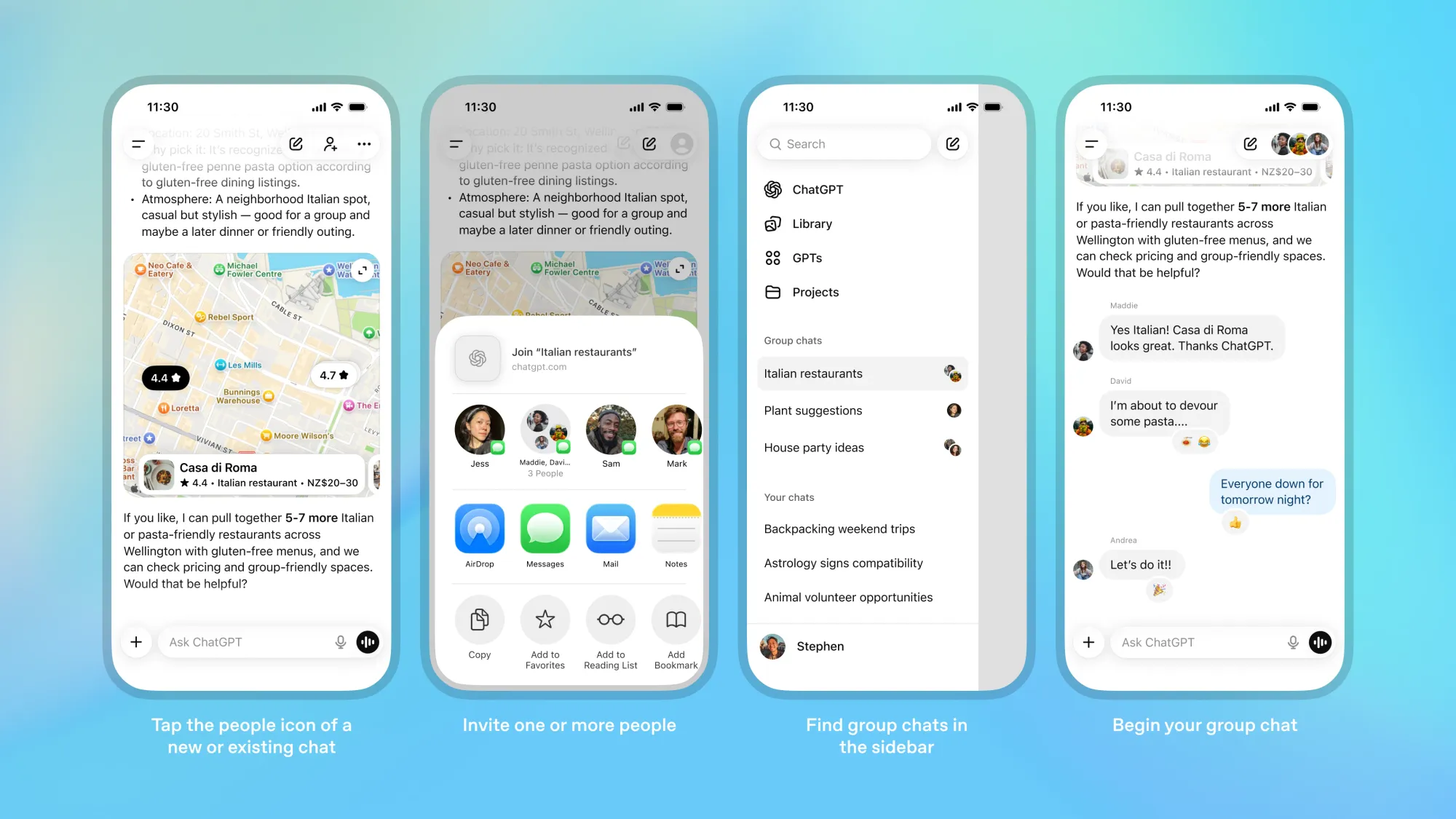ChatGPT Group Chats: The Next Step Toward AI Assisted Multi User Decision Making
ChatGPT Group Chat introduces a new era of multi user collaboration with AI embedded directly in the conversation. Discover how it works, where it is available, and why it could reshape digital teamwork.

The recently introduced ChatGPT Group chat feature marks a strategic evolution where multiple people can collaborate within a shared conversational environment while the AI participates as an active contributor. Instead of siloed one to one sessions, organisations can now explore AI augmented group reasoning, structured decision making and continuous knowledge alignment without switching tools or losing context along the way.

What Makes group chat Different
Traditional AI usage is highly personal. Each user builds their own context, history and reasoning path, which results in duplicated effort when working in teams. Group chat breaks that pattern by introducing a shared context layer where all participants see the same messages, files, refinements and AI contributions. This aligns the communication model with real team workflows rather than individual prompt sessions.
It effectively transforms ChatGPT from a private assistant into a shared intelligence node where learning, clarifications and conclusions become collective instead of isolated.
How It Works Inside the Interface
Users can start a new group from the ChatGPT interface and invite others directly or through a link. If an existing private chat is converted, the system automatically generates a separate copy to avoid accidental history exposure — an important design decision that prevents cross-context leakage while enabling continuity.
ChatGPT is able to participate actively but not intrusively. The model contributes when its input adds value rather than filling the conversation with unnecessary interjections. Participants can speak naturally, upload files, request summaries, validate assumptions or ask the model to compare options without resetting context or switching apps.
Availability and Rollout Status
Despite the excitement surrounding this update, ChatGPT Group chat is not yet globally released. OpenAI introduced it as a pilot available only in Japan, New Zealand, South Korea and Taiwan. There is no confirmed timeline for EU deployment, enterprise release or API integration.
This is important because organisations outside the pilot regions should treat the feature as an upcoming capability rather than a deployable component inside operational workflows.
Where it stands today
- Pilot release, limited geographic availability
- Supported across Free, Plus and Pro accounts
- Works on web, iOS and Android
- No enterprise governance layer announced
- No API or third-party integration details yet
Data Handling and Trust Considerations
Group chat conversations are isolated from personal chats and do not feed into personal memory features. This prevents unintended merging of personal context with shared discussions, which is a critical principle for multi user AI adoption. However, clarity around data retention, compliance controls, auditability, encryption guarantees, regional storage and enterprise data governance is not yet provided.
In other words, it is promising, but not ready for confidential, regulated or client sensitive collaboration until these elements are documented and verifiable.
Why It Matters for Forward-Thinking Teams
The strategic value sits in the collaboration model rather than the product interface. Modern teams often lose momentum due to fragmented communication spread across email, chat platforms, video calls, documentation tools and report cycles. Group chat introduces the possibility of reducing communication waste by embedding reasoning and context directly inside the discussion flow.
Potential benefits include
- Faster alignment and decision cycles
- Reduced re-explaining and context repetition
- Stronger shared understanding across stakeholders
- Built-in summarisation for post-meeting documentation
- Lower cognitive switching cost between tools
In future enterprise-ready form, this could become the foundation for AI assisted collaboration platforms where meeting minutes, knowledge bases and decision logs are generated passively from real discussion data, not reconstructed afterwards.
Scalevise Perspective
At Scalevise we evaluate AI capabilities based on feasibility, security, governance readiness and integration potential. ChatGPT Group chat introduces a powerful vision for multi user augmented intelligence, but remains in early-stage experimentation. It is worth monitoring, modelling and scenario planning, not deploying as a core collaboration layer yet. Once API access, compliance modes and enterprise guardrails are defined, the capability could be positioned within workflow automation, digital facilitation and collaborative decision intelligence.
The right strategic move today is preparing frameworks, not rolling out usage.
